|
| |
The Edge
Review by Carrie
Gorringe
Posted 26 September 1997
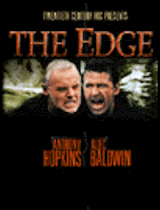 |
|
Directed by Lee Tamahori Starring Anthony Hopkins, Alec Baldwin,
Elle Macpherson, and Harold Perrineau
Screenplay by David Mamet |
Charles Morse (Hopkins) seems to
be a very lucky man; he’s a billionaire, with a beautiful supermodel wife named
Mickey (Macpherson). But there are problems: he doesn’t seem to trust anyone and,
despite his wife’s protestations of love, she also appears to have been put off by
his coldness and skittishness; when she tells her husband that he reminds her of an angel,
Morse brushes off her compliment by replying, "Everything but the wings." Mickey
is off to Alaska for a photo shoot with her favorite photographer Bob (Baldwin), who seems
somewhat too willing to read her kindness for something more significant – behavior
that is not lost on Mr. Morse. Bob, one of these unpleasant yuppie "artiste"
types replete in the stereotypical black leather and shallow mentality, doesn’t find
the atmosphere authentic enough for his perceptions, and sees the male model of his dreams
in a photo at the lodge. Informed that the model – actually, a hunter and trapper --
lives some eighty miles further north, Bob decides to fly up there and takes Mickey’s
husband with him and his assistant, Steve (Perrineau), with him. As the trapper is not at
his cabin, Bob wants to fly up to the lake, and disaster ensues, with a plane crash that
leaves Bob, his assistant, and Mickey’s husband stranded in the wilderness. Two
developments stand between them and the presumably typical survival experience. Morse, an
avid reader with computer-like powers of recall, has been avidly consuming, of all things,
a manual on just that topic throughout the film’s first half hour. Second,
there’s that one question that Morse asked Bob just before the plane crashed,
"So, how are you planning to kill me?" It’s a particularly jolting
non-sequitor that haunts their attempts to stay alive.
In 1994 Lee Tamahori burst into critical consciousness with Once Were Warriors,
a tale about the deleterious effects that white culture had had upon Maori life in New
Zealand. After a bad tumble with the neo-noir Mulholland Falls,
Tamahori has, in a way, returned to his original theme;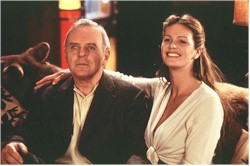 The Edge, for all of its concerns with man
versus nature and versus man, is also about the arrogance of silly white people who think
they can just alter culture, or, in this case, nature, with impunity. Having been seduced
by the pristine nature of the trees and the water, their instincts inured by years of
centralized climate control, twenty-four-hour supermarkets, and running water, they
conveniently forget that nature wields sharp teeth in her own defense. Re-reading accounts
of pioneer life, with its isolation, deprivation and constant risk, is a sobering reminder
of how little regard nature has for those without the knowledge to survive. Ask any
"weekend warrior" who has found him/herself stranded in the wilderness waiting
for the rescue team to arrive and has been lucky enough to survive the wait just how
willing he/she would be to undergo the experience again The above shouldn’t be
interpreted as an edict for a wholesale paving-over of paradise in favor of parking lots,
but the Rousseauesque interpretation of nature as wholesome and superior to civilization
is equally flawed. Nature has a level of absoluteness that modern mankind, with its
emphasis upon the ambiguities of urban life, tends to lack, and, when nature and mankind
meet on nature’s terms, the result can be deadly. The Edge, for all of its concerns with man
versus nature and versus man, is also about the arrogance of silly white people who think
they can just alter culture, or, in this case, nature, with impunity. Having been seduced
by the pristine nature of the trees and the water, their instincts inured by years of
centralized climate control, twenty-four-hour supermarkets, and running water, they
conveniently forget that nature wields sharp teeth in her own defense. Re-reading accounts
of pioneer life, with its isolation, deprivation and constant risk, is a sobering reminder
of how little regard nature has for those without the knowledge to survive. Ask any
"weekend warrior" who has found him/herself stranded in the wilderness waiting
for the rescue team to arrive and has been lucky enough to survive the wait just how
willing he/she would be to undergo the experience again The above shouldn’t be
interpreted as an edict for a wholesale paving-over of paradise in favor of parking lots,
but the Rousseauesque interpretation of nature as wholesome and superior to civilization
is equally flawed. Nature has a level of absoluteness that modern mankind, with its
emphasis upon the ambiguities of urban life, tends to lack, and, when nature and mankind
meet on nature’s terms, the result can be deadly.
The Edge captures this antinomial situation perfectly. As the men stumble toward
survival, they know (or will soon learn) there is no time for the luxury of indulging in
personal animosities. Only later, with safety in sight, can those problems reemerge. 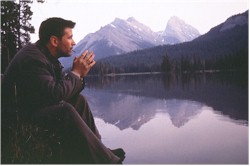 Naturally, with such issues
at the forefront, a film like this, in order to not only survive but excel at its task
requires three elements: a flawless script, direction and acting, especially from the two
male principals. The Edge has all three in excess (to the point where it can and it
should donate some of its overflow to certain other contemporary films in desperate need
which shall remain nameless). The tendency toward arch irony and smart patter that often
colors Mamet’s work, which can seem somewhat pretentious from time to time (certain
sections of American Buffalo and the opening sequence of Mamet’s new film, The Spanish Prisoner, fall into this
unfortunate category), is actually fitting for the extreme nature of the situation in
which the characters find themselves. At one point in their self-inflicted adventure, Bob
inquires of Morse as to the condition of Bob’s assistant. "How sick is he?"
asks Bob. Morse’s brittle, laconic response: "He’d have to get better to
die." In the midst of misery, you can either laugh or cry, and the characters in The
Edge are never short of blackly humorous retorts, producing them in mass quantities as
if they were talismans warding off the intervention of fate. Naturally, with such issues
at the forefront, a film like this, in order to not only survive but excel at its task
requires three elements: a flawless script, direction and acting, especially from the two
male principals. The Edge has all three in excess (to the point where it can and it
should donate some of its overflow to certain other contemporary films in desperate need
which shall remain nameless). The tendency toward arch irony and smart patter that often
colors Mamet’s work, which can seem somewhat pretentious from time to time (certain
sections of American Buffalo and the opening sequence of Mamet’s new film, The Spanish Prisoner, fall into this
unfortunate category), is actually fitting for the extreme nature of the situation in
which the characters find themselves. At one point in their self-inflicted adventure, Bob
inquires of Morse as to the condition of Bob’s assistant. "How sick is he?"
asks Bob. Morse’s brittle, laconic response: "He’d have to get better to
die." In the midst of misery, you can either laugh or cry, and the characters in The
Edge are never short of blackly humorous retorts, producing them in mass quantities as
if they were talismans warding off the intervention of fate.
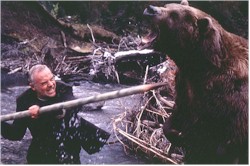 The Edge’s
plot structure, although fairly basic, is constructed on a strong narrative footing; the
situations in which Mamet and Tamahori place their characters are both plausible and truly
bone-chilling; a twenty-minute sequence involving Morse, Bob and a Kodiak bear (the
man-killing type) will freeze the hairs on the back of your neck permanently, and will
forever abolish any beliefs you have concerning the cuddliness and cuteness of bears.
Tamahori keeps the suspense rolling along nicely by a deft alternation between long shots
that keep the men isolated in their unwelcoming environment and tightly-edited action
sequences; viewers will not suffer from the problem of knowing what they’re looking
for or at, but they may want to reconsider looking at all during certain scenes. The Edge’s
plot structure, although fairly basic, is constructed on a strong narrative footing; the
situations in which Mamet and Tamahori place their characters are both plausible and truly
bone-chilling; a twenty-minute sequence involving Morse, Bob and a Kodiak bear (the
man-killing type) will freeze the hairs on the back of your neck permanently, and will
forever abolish any beliefs you have concerning the cuddliness and cuteness of bears.
Tamahori keeps the suspense rolling along nicely by a deft alternation between long shots
that keep the men isolated in their unwelcoming environment and tightly-edited action
sequences; viewers will not suffer from the problem of knowing what they’re looking
for or at, but they may want to reconsider looking at all during certain scenes.
The acting is immaculate, providing new insights into the respective talent pools of
Anthony Hopkins and Alec Baldwin; both actors dip in deeply, and surface with work that
registers quite strongly in the minds of the audience members. Once Sir Tony is given the
opportunity to cast off his bemused demeanor in the wild, he goes native with a vengeance.
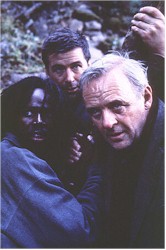 We’ve seen him give
out cold-edged grit before, in Silence of the Lambs, but Charles Morse is not
Hannibal Lecter. There is none of the detached rage of a serial killer at work here; the
rage in Morse is omnipresent, mixed with a strong dose of fear, and barely constrained by
a realization that resorting to urban paradigms of survival will result in death. It is
Morse who reminds Bob that most people stranded in the wilderness die, not from exposure,
but from the shame of not knowing what to do, with panic coming up close on the heels of
shame. Hopkins keeps Morse’s internal struggle against succumbing to shame up-front,
and, by so doing, keeps him interesting. This is truly a great performance, but the most
surprising one comes from Baldwin, whose acting skill has not been shown to its best
advantage of late (his role as the creepy extortionist in The Juror might have been
an exception to this statement had the film itself not been so ludicrous). He has all of
Bob’s nuances down pat, and then invests them with sufficient desperation to build a
human being who is more than your average urban hysteric with no access to a blow dryer.
Just when the audience thinks that Bob has settled into a pattern of blandness, Baldwin
will suddenly churn up the dark undercurrent in Bob’s personality, and like Hopkins
with Morse, keeps everyone guessing until the final reel. Macpherson and Perrineau add as
much depth as they can to what, essentially, are nothing more than minor supporting roles.
The Edge will take you as close as possible to excitement as it is possible to get
without actually being present, and who wants to wait in the cold for the rescue squad,
anyway? We’ve seen him give
out cold-edged grit before, in Silence of the Lambs, but Charles Morse is not
Hannibal Lecter. There is none of the detached rage of a serial killer at work here; the
rage in Morse is omnipresent, mixed with a strong dose of fear, and barely constrained by
a realization that resorting to urban paradigms of survival will result in death. It is
Morse who reminds Bob that most people stranded in the wilderness die, not from exposure,
but from the shame of not knowing what to do, with panic coming up close on the heels of
shame. Hopkins keeps Morse’s internal struggle against succumbing to shame up-front,
and, by so doing, keeps him interesting. This is truly a great performance, but the most
surprising one comes from Baldwin, whose acting skill has not been shown to its best
advantage of late (his role as the creepy extortionist in The Juror might have been
an exception to this statement had the film itself not been so ludicrous). He has all of
Bob’s nuances down pat, and then invests them with sufficient desperation to build a
human being who is more than your average urban hysteric with no access to a blow dryer.
Just when the audience thinks that Bob has settled into a pattern of blandness, Baldwin
will suddenly churn up the dark undercurrent in Bob’s personality, and like Hopkins
with Morse, keeps everyone guessing until the final reel. Macpherson and Perrineau add as
much depth as they can to what, essentially, are nothing more than minor supporting roles.
The Edge will take you as close as possible to excitement as it is possible to get
without actually being present, and who wants to wait in the cold for the rescue squad,
anyway?
Contents | Features
| Reviews | News | Archives | Store
Copyright © 1999 by Nitrate Productions, Inc. All Rights
Reserved.
| |
|